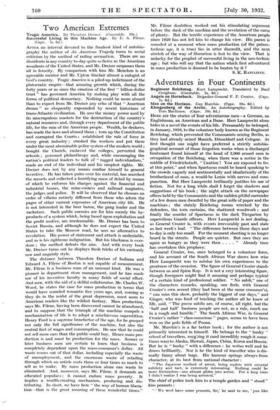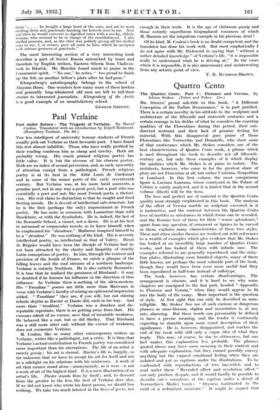Adventures in Four Continents
Regiment Reichstag. Kurt Lamprecht. Translated by Basil Creighton. (Constable. 7s. 6d.)
HERE are the stories of four adventurous men—a German, an
F.nglishman, an American and a Dane. Herr Lamprecht alone hides in a novel the events of his life. Presumably he belonged, in January, 1919, to the volunteer body known as the Regiment Reichstag, which prevented the Communists seizing Berlin, as they had already seized Munich, Diisseldorf and Cologne. At first thought one might have preferred a strictly autobio- graphical account of those forgotten weeks when a discharged lieutenant found himself at the head of 2,000 armed men in occupation of the Reichstag, when there was a notice in the middle of Friedrichstadt, " Caution ! You are exposed to fire at this point," and when Spartacus could be heard speaking to
the crowds vaguely and sentimentally and idealistically of the brotherhood of man, a would-be Lenin with nerves and com- punction. But Herr Lamprecht brilliantly justifies his use of fiction. Not for a long while shall I forget the shadows and
suggestions of his book ; the night attack on the newspaper offices held by the Communists and the sudden pitiful surrender of a few dozen men dwarfed by the great rolls of paper and the machines ; the stately Reichstag rooms wrecked by the defenders, the torn curtains, the shattered woodwork ; and finally the murder of Spartacus in the dark Tiergarten by supercilious Guards officers. Herr Lamprecht is not dealing, as General Crozier is, with events irrevocably past and stale
as last week's loaf. " The difference between those days and to-day is only too small. For the moment shooting is no longer
heard in the streets. People are quieter. But once they are again as hungry as they were then . . . . " Already time has overtaken this prophecy.
General Crozier, too, once belonged to a volunteer force, and his account of the South African War shows how wise Herr Lamprecht was to subdue his own experiences to the greatness of the occasion. The figure of General Crozier stands between us and Spion Kop. It is not a very interesting figure, though foreigners might fmd it amusing and perhaps typical
of a certain kind of professional soldier. " No .sahib," one of the characters remarks, speaking, one feels, with General Crozier's own accent (they had been at the same crammer's),
" can miss this show, probably the biggest of our days," and Ginger, who was fond of teaching the author all he knew of
life, said, " The pucca sahibs are, of course, all right, but the half and half' business people are not, as a rule, much use in a rough and tumble." The South African War, in General
Crozier's rather " class-conscious " pages, seems to have been won on the polo fields of Poona.
Mr. Murchie's is a far better book ; for the author is not primarily interested in himself. He belongs to the " husky " school of travellers, roughing it (and incredibly rough it some- times was) to Alaska, Hawaii, Japan, China, Korea and Russia. But he is " husky " with a difference : he writes well and he draws brilliantly. Nor is he the kind of traveller who is dis- mally funny about bugs. His humour springs always from character, at its best from national character :
" The Japanese method of arrest, being replete with oriental subtlety and tact, is extremely interesting. Nothing could be more frictionless—one almost glides into arrest. For a long time I didn't realize I was being arrested."
The chief of police took him to a temple garden and " stood" him peanuts :
We weel have some peanuts, Sir,' he said to me, ' you like them' ; . . . he bought a large bowl of the nuts, and set to work shelling them and graciously handing the kernels over to me. Now and then he would converse in dignified tones with a stocky, elderly woman, who seemed to be in charge of the establishment. I also shelled peanuts, and, as the chief was politely giving all his shelled nuts to me, I, in return, gave all mine to him, which he accepted with solemn gestures of gratitude."
The most interesting section of a very interesting book describes a part of Soviet Russia untouched by tours and therefore by English writers, Eastern Siberia from Vladivos- thek to Irkutsk. Mr. Murchie found much to praise in the Communist spirit. " No one," he notes, " too proud to finish up the fish on another fellow's plate after he had gone."
Klengenberg's autobiography belongs to the school of Aloysius Horn. One wonders how many more of these lawless and generally long-whiskered old men are left to tell their stories to interested journalists. Klengenberg of the Arctic is a good example of an unsatisfactory school.
Gitaultat GREENE.































 Previous page
Previous page